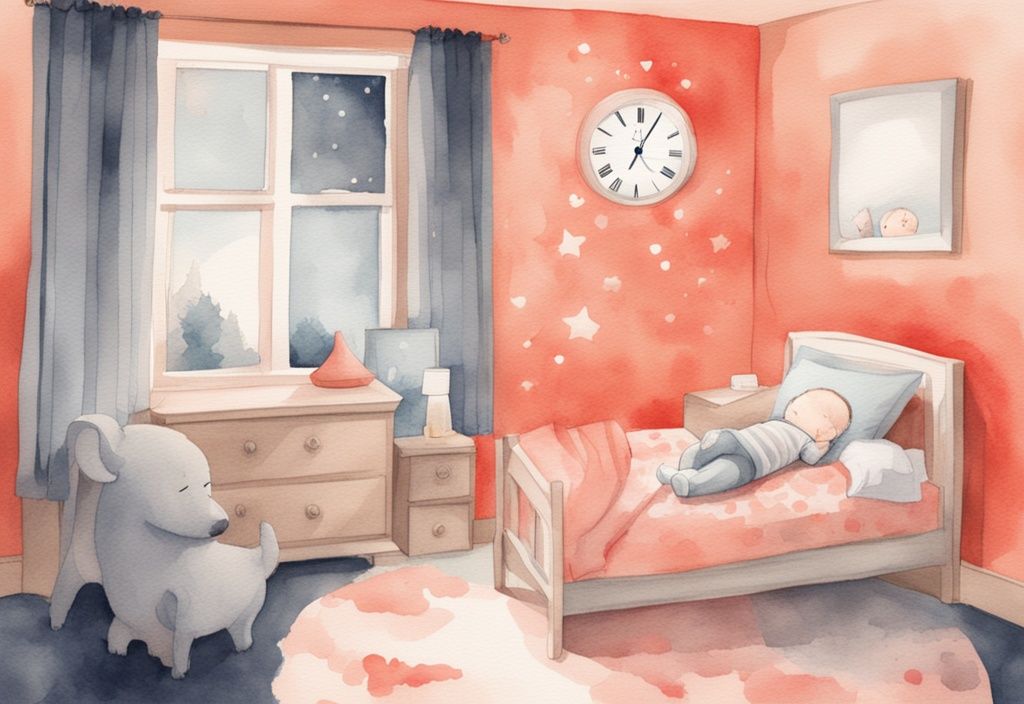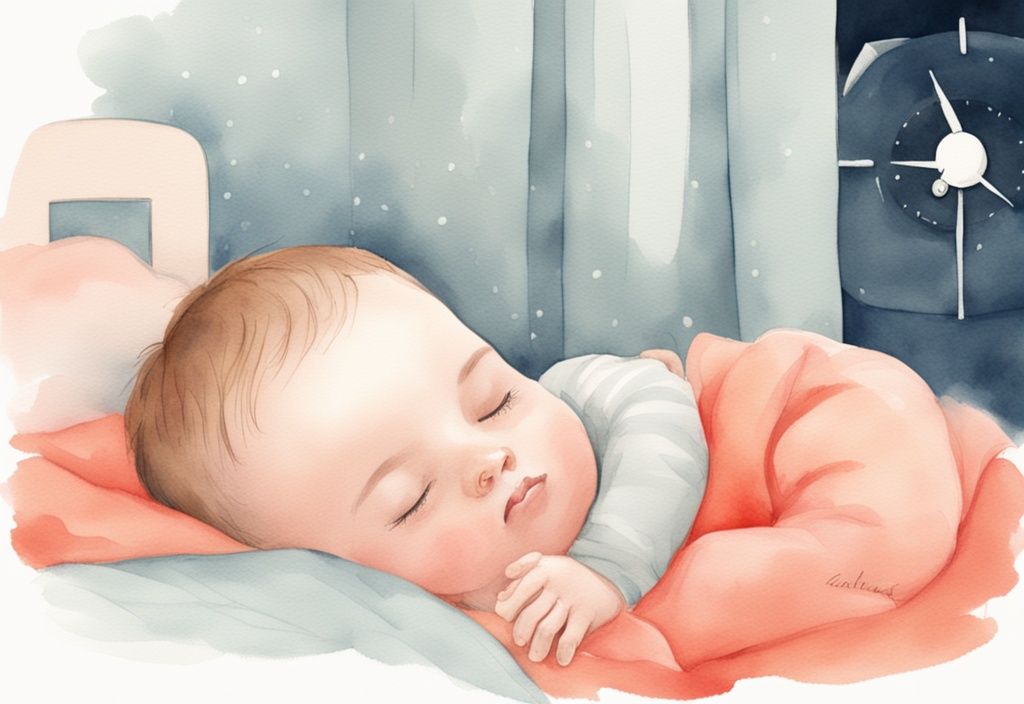Ever find yourself jolted awake at the ungodly hour of 3 A.M., your slumber shattered by your baby’s cries? Just like you, countless parents crave a solution to these late night wake-up cot calls that turn their dreamland into a distant reverie. But relief is just around the corner, my friend. Together, we’re going to decode this nocturnal mystery and help you recover that vital, uninterrupted nights of sleep.
In this guide, I’ve compiled practical insights to help you uncover the root causes of this common 3 A.M. wake-up pattern. We’ll explore how to curate the perfect sleep environment and identify easy-to-follow routines that can guide your little angel back into the cozy arms of sleep. Armed with these techniques and a dollop of Mommy/Daddy determination, you can successfully navigate your way towards peaceful nights and brighter mornings, for both you and your tiny tot.
So, buckle up and let’s journey together towards undisturbed slumbers and parenting wins. No more counting sheep, only sweet dreams await!
Why Is Your Baby Waking at 3 A.M.?
One critical factor in understanding how to stop baby waking at 3am is identifying the root causes of these night disruptions. Babies may wake up due to hunger, particularly in the early months when their tiny stomachs cannot hold much food.
Examining Common Causes for Night Wakings
Developmental milestones such as learning to roll over, sit up, or crawl can also disturb their sleep. Additionally, physical discomforts such as overheating or teething pain can wake a baby. It’s important to understand that night wakings are also a normal part of human sleep cycles; while adults generally know how to go back to sleep, babies need time to develop this ability.
Checking for discomforts like dirty diapers, an inappropriate room temperature, signs of illness, separation anxiety, or overtiredness can provide clues on how to stop baby waking at 3am.
Understanding Baby Sleep Cycles and Circadian Rhythms
To effectively address your baby’s night wakings, it is essential to comprehend their sleep cycles and circadian rhythms.
Babies have shorter and more frequent sleep cycles compared to adults. By 3 A.M., a lack of melatonin, the hormone that promotes sleep, may make it challenging for them to drift back to slumber.
Additionally, as the morning approaches, the body starts secreting cortisol—a hormone that stimulates wakefulness—around three hours before natural wake-up time. This often means approximately 3 A.M. for a baby who usually wakes at 6 A.M. Reinforcing healthy and consistent sleep habits can help mitigate these disruptions.
By understanding how to stop baby waking at 3am, parents can make the necessary adjustments to nighttime conditions and routines, promoting a more restful sleep for their little one.
Creating a Sleep-Optimal Environment for Your Baby
There’s a magic in crafting the perfect sleep setting for your little one. By focusing on key elements like darkness, temperature, and soothing sounds, you can help encourage longer and more restful sleep, potentially preventing those 3am wake-ups.
Making the Room Perfectly Dark
Creating a dark environment is essential for signaling melatonin production, which plays a crucial role in helping a baby stay asleep. Using blackout curtains can effectively block any external light sources that may intrude on your baby’s sleep.
Make sure the room remains dark throughout the night to maintain an environment conducive to sustained sleep. Additionally, avoiding exposure to screens such as TV, iPhones, and tablets at least an hour before bedtime is critical. These screens emit blue light, which can inhibit melatonin production and disrupt your baby’s ability to fall and stay asleep.
By managing these factors, you can take significant steps toward how to stop baby waking at 3am.
Setting the Ideal Room Temperature
Ensuring a comfortable room temperature is another foundational aspect of promoting good sleep habits. Overheating or being too cold can disrupt a baby’s sleep, causing frequent wake-ups.

Maintaining an optimal temperature between 68-72°F (20-22°C) can create a perfect sleeping environment. It’s important to monitor your baby’s comfort by adjusting clothing and bedding according to the room’s temperature.
Consistently keeping the room within this ideal range can help your baby remain asleep through the night, addressing how to stop baby waking at 3am.
The Impact of White Noise and Calm Surroundings
White noise machines can be valuable tools in creating a soothing sleep environment for your baby. The consistent and gentle sound can help mask other noises that might wake your baby during the night.
It’s also essential to ensure the room is free from potential disturbances, such as loud noises or sudden changes in lighting. Removing bright or stimulating objects from the sleep area can significantly contribute to a sleep-friendly setting.
By focusing on these factors, you can create an optimal environment conducive to better sleep and help address the issue of how to stop baby waking at 3am.
Building Consistent Sleep Routines for Your Baby
Designing Daytime and Nighttime Routines
Establishing a predictable and consistent sleep schedule is essential in solving the issue of how to stop baby waking at 3am. Integrate calming pre-sleep rituals such as a soothing bath, a gentle lullaby, or a brief storytime to signal that it’s time to unwind and sleep. This not only helps your baby relax but also fosters a peaceful transition to sleep.
Start dimming the lights around the house at least an hour before bedtime. This practice simulates the natural sunset, boosting melatonin production and setting the stage for a restful night.
The Importance of Consistent Sleep Schedule
Consistency in both daytime and nighttime routines plays a pivotal role in regulating your baby’s sleep cycle. Adhering to a consistent daily schedule with regular wake-up, nap, and bedtimes promotes better sleep patterns.
This predictability helps the baby’s internal clock stabilize, making it easier to manage how to stop baby waking at 3am. Reinforce these routines daily to ensure that your baby’s sleep-wake cycles become predictable and stable.
Relaxing Pre-Bedtime Rituals
Establishing calming pre-sleep rituals as part of the daily routine helps set a comforting and predictable pattern for your baby.
Avoid overstimulating activities or active playtime close to bedtime as these can energize rather than calm your baby. Instead, create a wind-down period with quiet activities such as reading a gentle story or softly rocking your baby. These soothing rituals ease the baby into a state conducive to sleep, addressing how to stop baby waking at 3am by ensuring they fall asleep calm and comforted. As babies grow, they reach various milestones, such as learning to climb stairs, which can also affect their sleep patterns.
Cultivating Healthy Sleep Habits for Babies
Nourishing Independent Sleep Skills
To help stop your baby waking at 3 A.M., it’s crucial to teach them independent sleep skills. This means creating a nighttime routine where your baby learns to fall asleep without relying on crutches like rocking or nursing.
Put your baby down awake for both nighttime sleep and daytime naps to encourage self-soothing skills. Think of it as a gradual journey rather than a quick fix. Consistency and patience are your best friends here. I remember countless nights gently guiding my little ones through this process, and trust me, it does pay off with better, longer sleep.

Addressing Night Hunger and Feedings
Managing night hunger effectively can significantly contribute to solving the issue of how to stop baby waking at 3 A.M. For newborns and younger infants, conduct feedings with minimal interaction and in a dark setting to avoid overstimulation.
As your baby grows, consult with your doctor to gradually reduce nighttime feedings. Implementing the feed-wake-sleep method can also be beneficial. This approach encourages the baby to eat after waking instead of just before going to sleep, helping to create a healthier sleep and feeding rhythm. I found that this method worked wonders with my little ones, fostering a peaceful night for the whole family.
Gradual Reduction of Nighttime Interactions
A successful strategy to stop your baby waking at 3 A.M. involves gradually reducing nighttime interactions. Try the “Pause Method”—wait a few minutes to see if your baby settles back to sleep independently before intervening.
When you do respond, keep interactions minimal and soothing to create a sense of security without fostering dependence. Avoid picking up your baby unless absolutely necessary. This encourages them to learn to self-soothe, reducing reliance on parental comforting.
When I practiced this with my own kids, it made a noticeable difference. Consistent application of this method can help your baby adapt to sleeping through the night more smoothly. Just remember, every baby is unique, so be gentle with yourself and your little one during this learning phase.
Appropriate Responses to Night Wakings
Navigating nighttime disturbances with your baby can be challenging. This section delves into practical methods that help ease that struggle, guiding you on how to stop your baby waking at 3am.
The Pause Method Explained
Allowing a few moments to see if your baby can resettle independently, known as “Practicing the Pause,” can be incredibly effective. Instead of rushing in at the first cry, give it a few minutes. This approach teaches essential self-soothing skills for uninterrupted sleep. Pay close attention to the types of cries to differentiate between a real need, like hunger or discomfort, and brief wake-ups during a sleep cycle.
Addressing Your Baby’s Needs Promptly
Swiftly addressing your baby’s needs is key to managing night wakings effectively. When your baby wakes at 3 A.M., identify the cause. Is it hunger, the need for comfort, or a room temperature adjustment? Be prompt but keep interactions calm and minimal to avoid over-stimulation. For example, feedings should be quiet, with dim lighting, signaling that it’s still nighttime. This helps teach your baby the difference between day and night.
Navigating Health Concerns and Discomforts
Consistent waking at 3 A.M. may point to underlying health issues causing discomfort. Problems like teething, ear infections, or sleep regressions can disrupt sleep. Watch for signs like excessive drooling or ear tugging to identify these issues. If frequent night wakings continue, consult with your pediatrician to rule out conditions such as sleep apnea or acid reflux. Ensuring your baby’s comfort can greatly assist in stopping the 3 A.M. wake-ups.
Additional Strategies to Curb 3 A.M. Waking
Wondering how to stop baby waking at 3am? Let’s explore some effective strategies that might help you tackle those early morning wake-ups.
Benefiting from the Dream Feed Technique
If you’re wondering how to stop baby waking at 3am, the dream feed technique might be a game changer. This involves feeding your baby while they are still asleep, usually around 10-11 PM, just before the parents’ bedtime. By doing so, you could potentially shift your baby’s sleep schedule, making it less likely for them to wake up early in the morning.
Imagine peacefully feeding your baby in a dimly lit room, just before you head to bed. The idea is that the dream feed provides enough nourishment to get them through to their natural wake-up time. Ensure the environment stays peaceful to avoid fully waking the baby.
How Proper Nap Scheduling Can Make a Difference
Proper nap scheduling during the day is crucial in managing nighttime wake-ups. Consistent daytime naps can prevent overtiredness, a common cause of frequent night awakenings. Daytime sleep and exposure to natural sunlight help in regulating your baby’s melatonin production, which is essential for better nighttime sleep.
Contrary to some beliefs, sufficient daytime sleep does not disrupt nighttime sleep; on the contrary, it promotes overall better rest. Regular napping can be an effective strategy if you’re learning how to stop baby waking at 3am.
Seeking Professional Help When Necessary
When attempting to figure out how to stop baby waking at 3am, sometimes personalized advice can make all the difference. Consulting a certified pediatric sleep consultant can provide tailored strategies specific to your baby’s needs. Complex sleep issues might have underlying causes that aren’t straightforward and may require professional intervention.

By seeking expert guidance, you get customized solutions and support that could make significant improvements in your baby’s sleep patterns.
Importance of Parental Self-Care in this Process
Taking care of yourself is vital when addressing your baby’s sleep challenges. Maintain patience and persistence as you guide your baby towards better sleep habits. Ensuring your own physical and mental health is in check will give you the energy and patience required in this process. Remember, staying calm and consistent is key, both for your well-being and for successfully figuring out how to stop baby waking at 3am.
Your self-care is just as important in fostering a healthy sleep environment for your baby.
FAQ
Why does my baby wake at 3 A.M.?
Many babies have a knack for waking at 3 A.M., and it can often be linked to a variety of reasons. Sometimes they’re just plain hungry or bursting with new developmental milestones. Other times, overheating or teething could be the culprits. The natural dip in melatonin and the rise in cortisol around this time also play a role. Understanding your baby’s sleep cycles and circadian rhythms gives you better insight into these early morning wake-ups.
How can I make my baby’s room more sleep-friendly?
One of the key tricks is to make the room as dark as possible. Blackout curtains work wonders here. Keep the room cozy with an ideal temperature between 68-72°F (20-22°C). Adding a white noise machine creates a soothing, consistent sound environment that can work like a charm in improving sleep quality.
What are the best routines to stop my baby from waking at 3 A.M.?
Creating a consistent sleep schedule is a lifesaver, with regular wake-up and bedtimes. Incorporating calming pre-sleep rituals such as a warm bath, gentle rocking, or soft lullabies sets the perfect tone for sleep. The “Pause Method” can also be your best friend, teaching your baby to self-soothe and slowly reducing the need for nighttime intervention.
Should I consult a sleep professional for my baby’s sleep issue?
If your baby’s night waking continues and you suspect underlying health concerns like sleep apnea or acid reflux, seeking professional help can be beneficial. A certified pediatric sleep consultant can offer tailored advice and personalized strategies to tackle more complex sleep issues.
Summary and Takeaway Tips
- Consistency is Key: In your journey to understanding how to stop baby waking at 3am, remember that consistent sleep and nap schedules are crucial. Keeping regular bedtimes and wake-up times helps regulate your baby’s internal clock, leading to longer, uninterrupted sleep. Imagine it as setting the stage for a bedtime routine that becomes second nature to your little one.
- Create a Sleep-Friendly Environment: Crafting a cozy and secure sleep environment plays a big role in how to stop baby waking at 3am. Think of it like creating a peaceful sanctuary. Use blackout curtains to keep the room dark, maintain a comfortable temperature between 68-72°F (20-22°C), and consider a white noise machine to mask disturbances. Small changes can make a big difference!
- Foster Independent Sleep Skills: One of the keys to reducing those early morning awakenings is helping your baby learn to sleep independently. By putting your baby down when they’re still awake, you’re teaching them to self-soothe and fall back asleep on their own. This can lead to fewer night-time wake-ups and a more rested family.
- Try Dream Feed and the “Pause Method”: A dream feed, usually given between 10-11 PM, can adjust your baby’s sleep cycle and decrease the likelihood of waking at 3am. If you’re wondering what to do with a 5 month old baby all day, introducing the “Pause Method”—where you wait a few minutes to see if your baby resettles before intervening—encourages self-soothing and may prevent wake-ups over time.
- Seek Professional Advice and Parental Self-Care: Sometimes, despite our best efforts, early morning wakings persist. Reaching out to a certified pediatric sleep consultant can offer tailored strategies for your baby’s unique needs. Also, never underestimate the importance of taking care of yourself. Consistent self-care and patience are vital in supporting your baby through these sleep challenges. Remember, you’re doing an amazing job!


